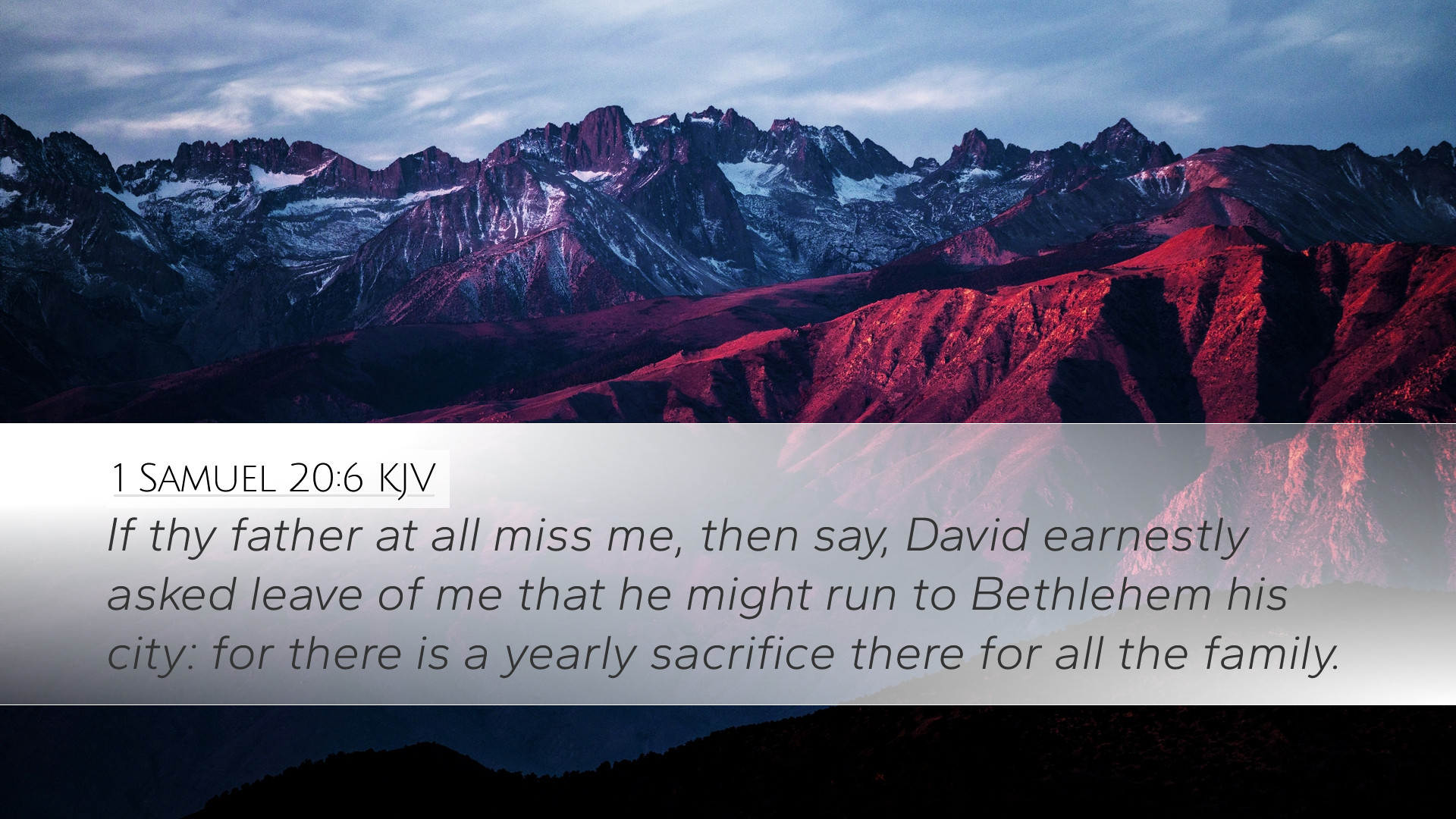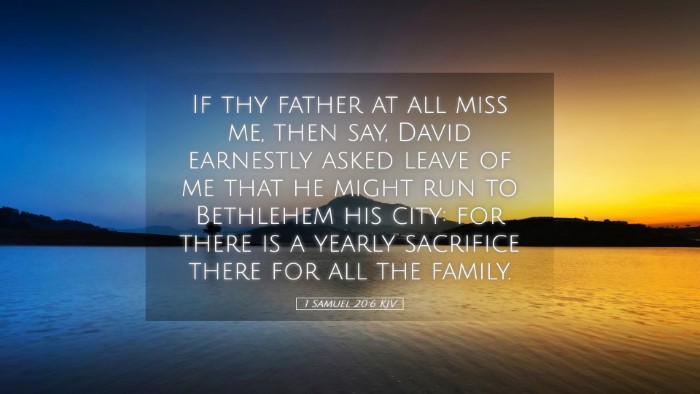Commentary on 1 Samuel 20:6
Verse: 1 Samuel 20:6 - "If your father at all miss me, then say, David earnestly asked leave of me that he might run to Bethlehem, his city: for there is a yearly sacrifice there for all the family."
Contextual Background
This verse is situated within the narrative of 1 Samuel, which chronicles the life and rise of David amid the tensions with King Saul. David has become the target of Saul’s jealousy, and in this instance, he seeks to evade Saul's wrath by appealing to Jonathan, Saul's son and David's close friend.
Theological Insights
This passage reveals several theological themes to consider:
- The Nature of Friendship: The bond between David and Jonathan exemplifies true friendship. Jonathan's loyalty to David, despite the risk of his own standing with Saul, demonstrates the sacrificial nature of genuine relationships.
- Divine Providence: The circumstances surrounding David's need to excuse himself from Saul's presence highlight God's providential hand in David's life. Even in dire situations, God provides means for deliverance.
- Worship and Sacrifice: The mention of the yearly sacrifice in Bethlehem offers a glimpse into the communal aspect of worship among the Israelites. It reflects the importance of family and communal religious observance.
Exegesis and Commentary
In examining this verse, several public domain commentaries provide valuable insights:
Matthew Henry’s Commentary
Matthew Henry emphasizes the importance of integrity and honesty in David's request to Jonathan. He notes that David's clever reasoning not only seeks to explain his absence but also highlights the seriousness of the situation. Henry suggests that David's approach displays both wisdom and humility, essential traits for future leaders. Moreover, he reflects on the spiritual implications of David’s request, noting that it aligns with God's providence guiding David towards his future role as king.
Albert Barnes’ Notes on the Bible
Albert Barnes focuses on the sociopolitical realities at play in this passage. He remarks on the need for David to navigate a treacherous relationship with Saul carefully. Barnes conveys the pressure David was under and underscores the bravery required to confront such instability within the king’s court. Additionally, he reflects on the significance of the family sacrifice, illustrating how it serves both as an excuse for David’s absence and as a reminder of the communal and familial bonds that underpin Jewish life.
Adam Clarke's Commentary
Adam Clarke provides a contextual analysis of the yearly sacrifice, detailing its significance within Israel’s religious life. He points out the festival's potential necessity for family unity and the role it plays in maintaining familial and tribal identities. Clarke also addresses Jonathan's possible deep understanding of David's circumstances, showcasing Jonathan’s wisdom in supporting David amidst familial strife, suggesting their friendship was imbued with a prophetic understanding of David's destiny.
Applications for Pastors and Theologians
This verse offers rich applications for contemporary pastoral ministry and theological reflection:
- Faithfulness in Relationships: Pastors can draw upon the model of David and Jonathan in their messages, emphasizing loyalty and support within the Christian community.
- Discernment in Leadership: The tension between David and Saul provides a framework for church leaders to understand the complexities of authority and the need for humility and wisdom when navigating conflicts.
- Encouragement from God’s Plan: Just as God had a plan for David that included challenges and opposition, believers today can be reminded that their struggles are part of a greater divine narrative.
Conclusion
1 Samuel 20:6 encapsulates critical relational dynamics, theological implications, and practical applications that resonate throughout Scripture and into the lives of modern believers. Understanding this verse requires a careful study of its context and its implications for faithfulness amid trials. The insights from respected commentators like Matthew Henry, Albert Barnes, and Adam Clarke enrich our understanding and encourage deeper reflection on the interplay of faith, friendship, and divine providence.


